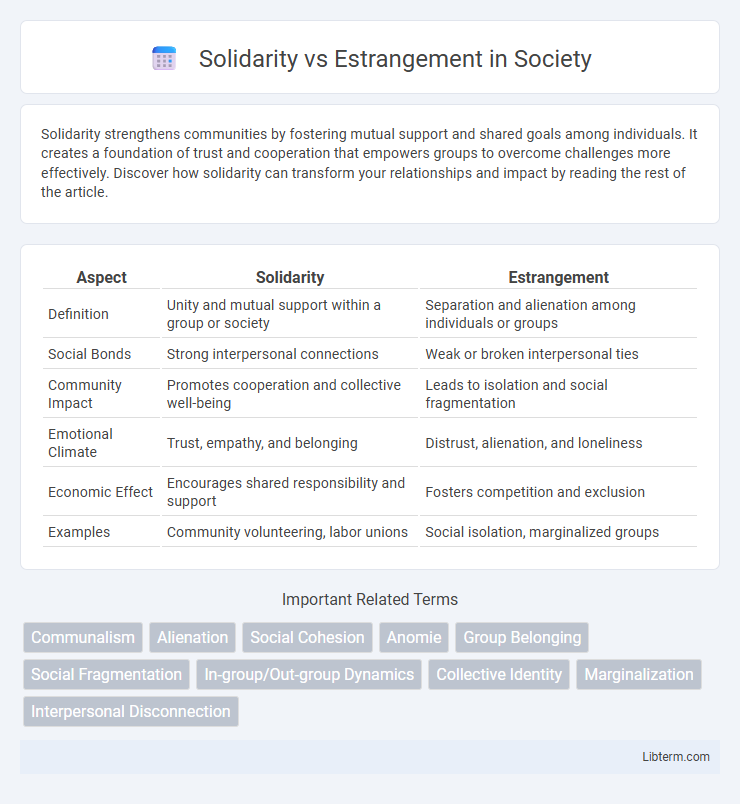Solidarity strengthens communities by fostering mutual support and shared goals among individuals. It creates a foundation of trust and cooperation that empowers groups to overcome challenges more effectively. Discover how solidarity can transform your relationships and impact by reading the rest of the article.
Table of Comparison
| Aspect | Solidarity | Estrangement |
|---|---|---|
| Definition | Unity and mutual support within a group or society | Separation and alienation among individuals or groups |
| Social Bonds | Strong interpersonal connections | Weak or broken interpersonal ties |
| Community Impact | Promotes cooperation and collective well-being | Leads to isolation and social fragmentation |
| Emotional Climate | Trust, empathy, and belonging | Distrust, alienation, and loneliness |
| Economic Effect | Encourages shared responsibility and support | Fosters competition and exclusion |
| Examples | Community volunteering, labor unions | Social isolation, marginalized groups |
Understanding Solidarity: Foundations and Principles
Solidarity is grounded in shared values, mutual respect, and collective responsibility, fostering social cohesion and cooperative action among individuals and groups. It emphasizes empathy, trust, and the recognition of interdependence as essential principles that bind diverse members of a community. Understanding solidarity requires analyzing its role in promoting inclusive participation, reducing social inequalities, and strengthening communal bonds through active engagement and support.
The Roots and Causes of Estrangement
Estrangement originates from social disconnection, often fueled by unresolved conflicts, differing values, and lack of empathy between individuals or groups. Psychological factors such as fear, mistrust, and communication breakdowns exacerbate feelings of isolation, leading to weakened interpersonal bonds. Structural issues like economic inequality and cultural divides further deepen estrangement by limiting opportunities for meaningful engagement and mutual understanding.
Historical Perspectives: Solidarity in Social Movements
Historical perspectives reveal that solidarity has been a foundational element in successful social movements such as the Civil Rights Movement in the United States and the anti-apartheid struggle in South Africa. Solidarity fosters collective identity and mobilization, enabling marginalized groups to challenge systemic oppression and pursue social justice goals. The breakdown of solidarity, or estrangement, often leads to fragmentation and weakened efforts within movements, highlighting its critical role in sustaining momentum and achieving political change.
Estrangement in Modern Society: Causes and Consequences
Estrangement in modern society stems from factors such as rapid urbanization, digital isolation, and socioeconomic disparities that disrupt traditional social bonds. This phenomenon leads to increased feelings of alienation, mental health challenges, and weakened community cohesion. Persistent estrangement undermines social solidarity, impairing collective action and societal resilience.
The Psychological Impact of Solidarity
Solidarity fosters a profound psychological sense of belonging, reducing feelings of isolation and enhancing emotional resilience. The collective support inherent in solidarity promotes increased self-esteem and mental well-being by validating individual experiences through shared purpose. This psychological impact mitigates anxiety and depression, strengthening social bonds crucial for coping with stress and adversity.
Estrangement and Its Effects on Mental Health
Estrangement often leads to increased feelings of loneliness and social isolation, which significantly impact mental health by heightening the risk of depression and anxiety disorders. Chronic emotional detachment from family or social groups can disrupt an individual's sense of identity and belonging, exacerbating stress levels and impairing overall well-being. Research indicates that prolonged estrangement is associated with diminished psychological resilience and lowered life satisfaction, underscoring the importance of addressing relational disconnection in mental health interventions.
Building Bridges: Strategies for Fostering Solidarity
Building bridges to foster solidarity involves creating inclusive environments that encourage open dialogue and mutual understanding among diverse groups. Implementing community engagement programs and collaborative projects helps dismantle barriers of estrangement by promoting shared goals and collective action. Emphasizing empathy, active listening, and cultural competence strengthens social bonds and nurtures a sense of belonging within communities.
Overcoming Barriers: Addressing Estrangement in Communities
Overcoming estrangement in communities requires fostering solidarity through inclusive dialogue and shared goals that bridge social, cultural, and economic divides. Initiatives such as community forums, collaborative projects, and support networks help dismantle prejudices and build trust among disparate groups. Strengthening local institutions and promoting empathy-oriented programs encourage sustained engagement, transforming isolation into collective empowerment.
The Role of Technology: Connecting or Dividing?
Technology acts as a double-edged sword in the dynamics of solidarity and estrangement, fostering connectivity through social media platforms, real-time communication tools, and collaborative technologies that bridge geographical divides and cultivate shared communities. Conversely, algorithm-driven echo chambers and digital isolation contribute to social fragmentation, amplifying feelings of estrangement by limiting diverse interactions and reinforcing polarized worldviews. The complex interplay between technological innovation and human social behavior significantly influences whether society experiences unity or division.
Solidarity vs Estrangement: Toward an Inclusive Future
Solidarity fosters social cohesion by promoting empathy, collaboration, and shared values across diverse communities, laying the foundation for an inclusive future. Estrangement, characterized by alienation and fragmentation, undermines trust and perpetuates social divides that hinder collective progress. Emphasizing solidarity in policy-making and community-building initiatives drives inclusive growth and equitable opportunities for marginalized groups.
Solidarity Infographic

 libterm.com
libterm.com